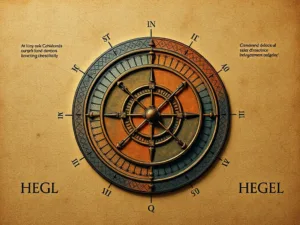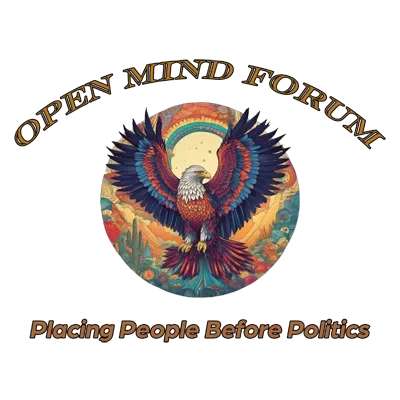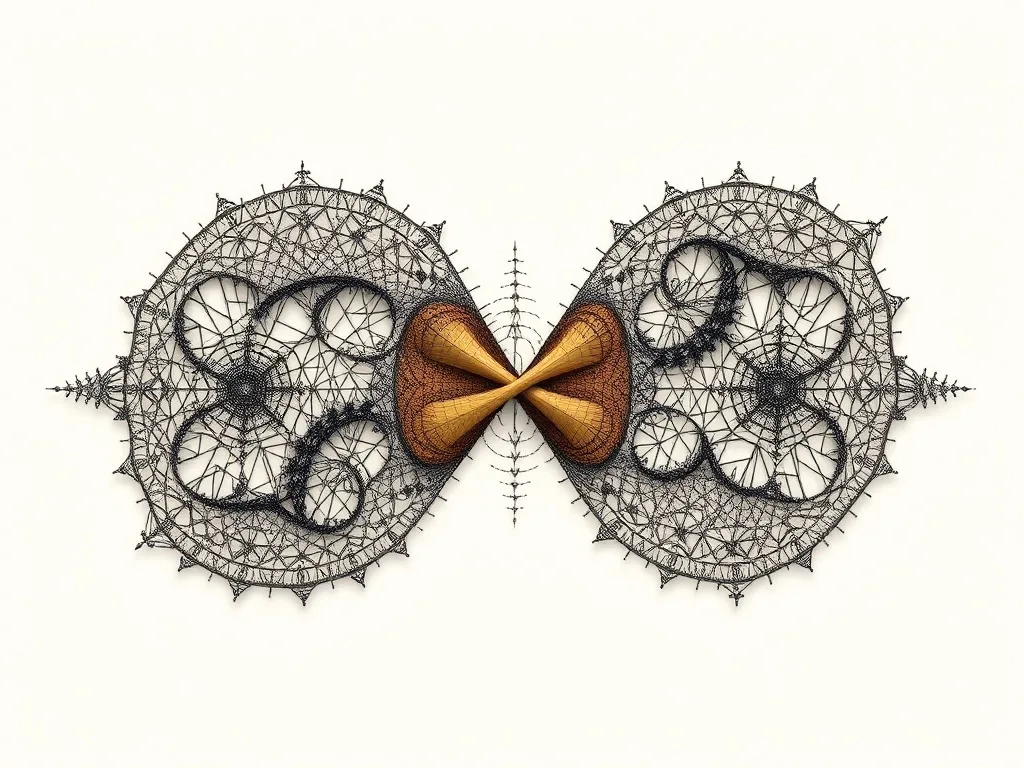An Expansive Framework for Understanding Reality
An Introduction to Hegel’s Dialectical Method
Hegel’s Dialectical Method is the cornerstone of his philosophical methodology. Understanding the dialectical method makes reading Hegel far more gratifying. Hegel’s philosophy has profoundly shaped Western thought, influencing fields like metaphysics, history, and political

theory. At its core, his work seeks to reconcile contradictions within reality, demonstrating how opposites synthesize into higher truths. Hegel’s idealism, his dialectical method, and his concept of Absolute Spirit form the pillars of his philosophical system.
However, despite its intellectual ambition, Hegel’s philosophy faces significant critiques regarding its abstractness, alleged determinism, and political implications. This essay explores the key ideas within Hegel’s philosophy, supported by detailed examples, before delving into major criticisms of his thought.
Hegel’s Dialectical Method: Key Concepts
The Dialectic
Hegel’s dialectical method operates through a triadic process: thesis, antithesis, and synthesis. This method illustrates how contradictions drive progress. A clear example lies in his analysis of master-slave relationships in The Phenomenology of Spirit. Here, the master (thesis) dominates the slave (antithesis), creating a relationship of dependency that ultimately collapses. The synthesis occurs when mutual recognition emerges, paving the way for a higher understanding of freedom.

This dialectical model extends beyond individual consciousness to history itself. For instance, the French Revolution exemplifies a dialectical moment: the thesis of absolute monarchy met the antithesis of revolutionary fervor. The ensuing synthesis, while imperfect, contributed to modern constitutional governance.
Another example appears in Hegel’s critique of religion. In The Phenomenology of Spirit, he examines faith’s evolution from natural religions (thesis) through institutional Christianity (antithesis) to the reconciliation of faith and reason in philosophy (synthesis). This demonstrates how dialectics structure cultural and spiritual development.
Absolute Idealism
Hegel’s Absolute Idealism posits that reality reflects a rational structure unfolding toward the Absolute. In The Science of Logic, he uses the example of a seed transforming into a tree to illustrate this concept. The seed contains within it the rational potential of the tree, which actualizes through a process of contradiction (e.g., breaking out of the ground) and resolution.
History provides another illustration. In The Philosophy of History, Hegel describes the progression from ancient empires to the modern nation-state as a realization of human freedom. For example, the Roman Empire represented a significant advance in legal rationality but lacked individual liberty. The synthesis emerges in modern constitutional democracies, which balance collective order with individual rights.
Hegel also applies this framework to art, arguing that classical Greek sculpture (thesis), which emphasized ideal beauty, gave way to Christian art (antithesis), prioritizing spiritual depth. The synthesis, he suggests, lies in Romantic art, which harmonizes spiritual and aesthetic dimensions.
Hegel’s Dialectical Method: Freedom and History
Hegel asserts that history represents the unfolding of freedom. In The Philosophy of History, he analyzes historical progress as the gradual realization of human rights. For instance, he views the Protestant Reformation as a pivotal event, breaking from hierarchical authority and emphasizing individual conscience. This shift, according to Hegel, set the stage for Enlightenment values and modernity.
Yet, Hegel’s Eurocentric framing skews this narrative. He describes non-European societies as “static” or “pre-historical,” relegating them to the margins of progress.

. Critics, such as Susan Buck-Morss, have highlighted how such omissions undermine his claims of universality.
Significant Critiques of Hegel’s Dialectical Method
Overly Abstract and Systematic
Hegel’s work often draws criticism for its abstraction. Arthur Schopenhauer derided Hegel’s idealism as esoteric and disconnected from reality, famously dismissing it as “a colossal piece of mystification.” Bertrand Russell echoed this sentiment, arguing that Hegel’s logic sacrificed clarity for grandiose generalizations.
For example, consider Hegel’s concept of the Absolute Spirit. While intended to capture the totality of reality, critics contend that it risks reducing lived experiences to theoretical constructs. Feminist scholars, such as Luce Irigaray, have critiqued this abstraction for neglecting embodied realities like gender and difference.
Determinism in History
Hegel’s philosophy of history faces accusations of determinism, particularly his portrayal of historical progress as inevitable. Isaiah Berlin critiqued this determinism, suggesting it marginalizes dissenting voices. For example, Hegel’s analysis of the French Revolution emphasizes its contribution to freedom but downplays its contradictions, such as the rise of authoritarianism under Napoleon.
Similarly, critics question whether Hegel’s framework can account for historical events that resist synthesis. The persistence of colonialism and systemic inequality, for instance, complicates the narrative of progress. Philosophers like Walter Benjamin have argued that such “progress” often comes at the expense of marginalized groups.
Political Implications of Hegel’s Dialectical Method
Hegel’s Philosophy of Right advocates for reconciling individual freedom with state authority. Critics like Karl Popper have argued that this perspective risks justifying authoritarianism. Popper points to Hegel’s praise for the Prussian state as evidence of his philosophy’s conservative underpinnings.
However, this critique oversimplifies Hegel’s nuanced view of freedom. He emphasizes that true freedom requires participation in ethical life, encompassing family, civil society, and the state. Nonetheless, the tension between individual autonomy and collective authority remains unresolved, making Hegel’s political philosophy a focal point of debate.
Sources Cited
Hegel, G.W.F. The Phenomenology of Spirit. Translated by A.V. Miller, Oxford University Press, 1977.
Hegel, G.W.F. The Philosophy of History. Translated by J. Sibree, Batoche Books, 2001.
Schopenhauer, Arthur. Parerga and Paralipomena. Translated by E.F.J. Payne, Clarendon Press, 1974.
Popper, Karl. The Open Society and Its Enemies. Routledge, 1945.
Buck-Morss, Susan. Hegel, Haiti, and Universal History. University of Pittsburgh Press, 2009.
Irigaray, Luce. The Speculum of the Other Woman. Translated by Gillian C. Gill, Cornell University Press, 1985.
Suggestions for Further Reading
The Phenomenology of Spirit by G.W.F. Hegel – A profound exploration of consciousness, freedom, and the dialectical process.
The Science of Logic by G.W.F. Hegel – Hegel’s foundational text on logic and reality’s rational structure.
Hegel by Charles Taylor – An accessible yet comprehensive introduction to Hegel’s philosophical system.
The Open Society and Its Enemies by Karl Popper – A critique of Hegel’s perceived authoritarian leanings.
Hegel’s Idealism: The Satisfactions of Self-Consciousness by Robert Pippin – A defense of Hegel’s relevance to contemporary debates.
Hegel, Haiti, and Universal History by Susan Buck-Morss – Examines Hegel’s Eurocentrism and its global implications.
Walter Benjamin: A Critical Life by Howard Eiland and Michael W. Jennings – A study of Benjamin’s critique of historical progress.
Feminist Interpretations of Hegel edited by Patricia Jagentowicz Mills – Examines feminist critiques of Hegel’s abstract idealism.
Disclaimer: The images and videos in this post are AI-generated creations, intended purely for illustrative and conceptual purposes. They are not real-life representations and should not be interpreted as such. Their sole purpose is to offer a visual means of exploring the topics discussed in this post.




